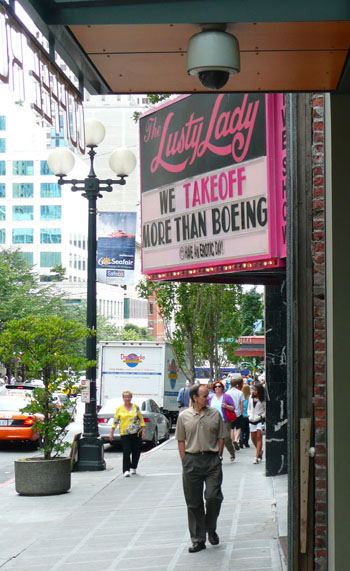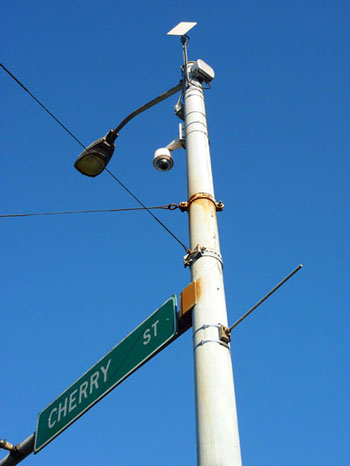“The Right To The City”
 Hey man, don’t you even try to sneak a quick, furtive glance into the entrance of the Lusty Lady. Cause in case you didn’t notice, that black and white orb hanging beneath the canopy on the Four Seasons building is a surveillance camera. Is the camera pointed your way? Is it recording 24×7?  Who knows, but it could be, so you best not exhibit any untoward behavior.
Hey man, don’t you even try to sneak a quick, furtive glance into the entrance of the Lusty Lady. Cause in case you didn’t notice, that black and white orb hanging beneath the canopy on the Four Seasons building is a surveillance camera. Is the camera pointed your way? Is it recording 24×7?  Who knows, but it could be, so you best not exhibit any untoward behavior.
I work next door to the Lusty Lady and walk past it several times a week. And whenever I happen to see someone on the way out I can’t help wondering how strongly these customers may or may not be feeling the stigma, with the public eye upon them as they engage in this socially unacceptable form of commerce. And now the eye of a camera is also a potential witness, with the bonus of indefinite storage and easy retrieval of the evidence.
Seattle is not as infested with surveillance cameras as many other cities in the world—London being the most notable example, literally with a camera on every street corner. But sadly, Seattle also appears to be trending in that direction, though that would make it no different from pretty much every place on the planet where there are people. New York City. And now even Paris, the City of Love. This is not a sign of healthy societies.
Last year the City of Seattle snuck “security” cameras into Cal Anderson Park on Capitol Hill. When the news got there was some short-lived public outcry and the ACLU objected, but the cameras are still there. This summer, the Parks Department installed three surveillance cameras around the Garfield Community Center in the Central District, and few seemed to mind.
 Though the circumstances justifying surveillance may vary, in the end what it comes down to is that these cameras are band aid solutions that ask us to give up freedom in exchange for security. And in this case it wouldn’t be all that smug to add that we “deserve neither,” given the limited impact the cameras appear to have on crime.
Though the circumstances justifying surveillance may vary, in the end what it comes down to is that these cameras are band aid solutions that ask us to give up freedom in exchange for security. And in this case it wouldn’t be all that smug to add that we “deserve neither,” given the limited impact the cameras appear to have on crime.
The more we regulate public spaces, the more we give up the “right to the city,” defined by Lefebvre as the right to “urban life, to renewed centrality, to places of encounter and exchange, to life rhythms and time uses, enabling the full and complete usage of… moments and places.” Like say, when you’re walking home with your sweetie through your neighborhood park on a beautiful summer night, no one else around and a perfect moment for a passionate kiss, do you want to be wondering in the back of your mind if you might be on candid camera?
